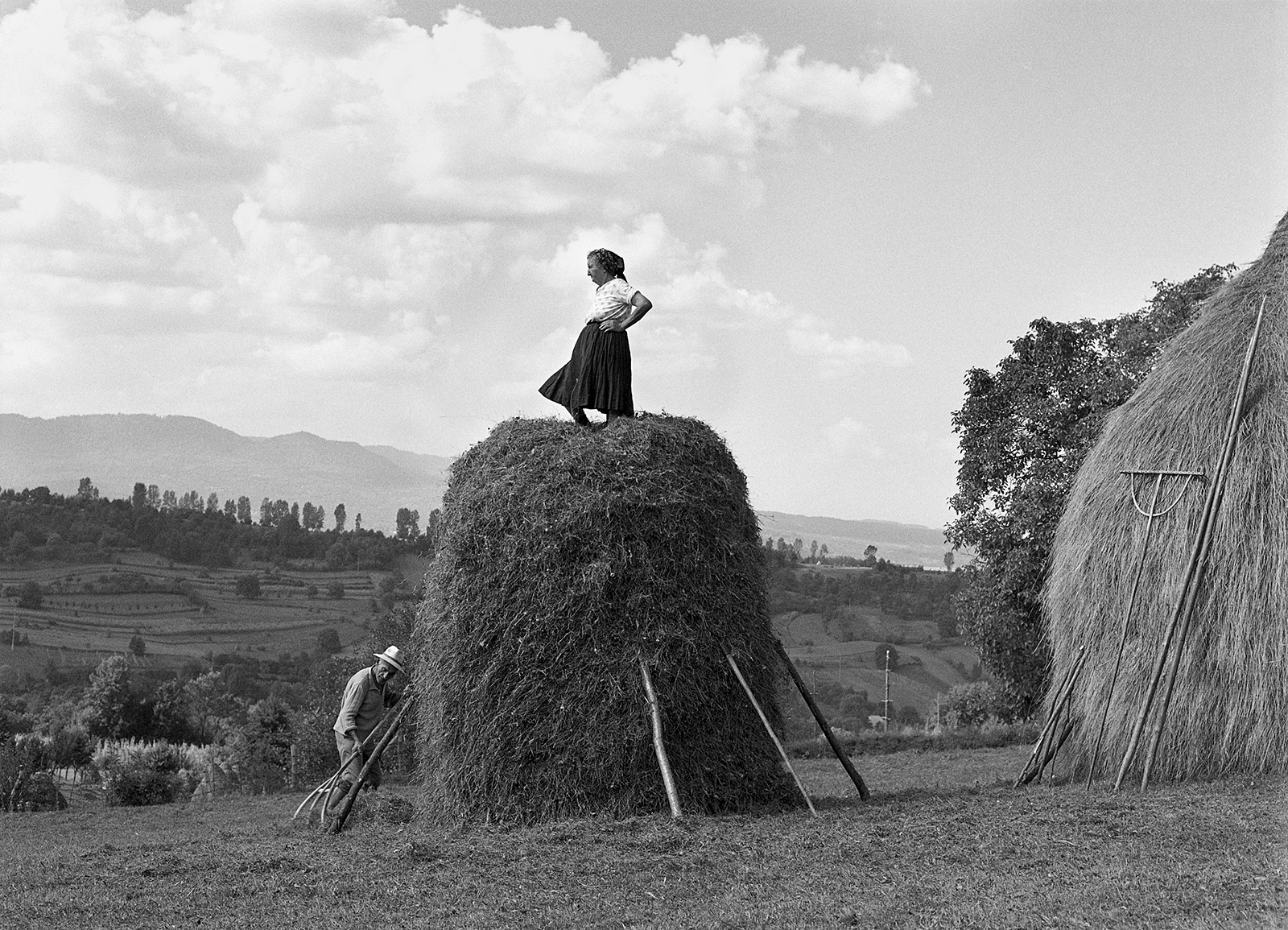
Making a Haystack, Sîrbi
At the turn of the millennium, for a year of days beginning in the autumn of 1999, Kathleen and her husband Henry lived in a remote village, in the Maramures region of northern Transylvania, Romania. This region is unique amongst the former Soviet Bloc for the way it preserved its way of life. After World War II, for forty years of communist rule, a few valleys in Maramures escaped collectivized farming because of poor soil and hilly landscape. In the post cold-war period, preservation continued because of pervasive impoverishment which slowed the advancement of modernity into the reaches of northern Transylvania.
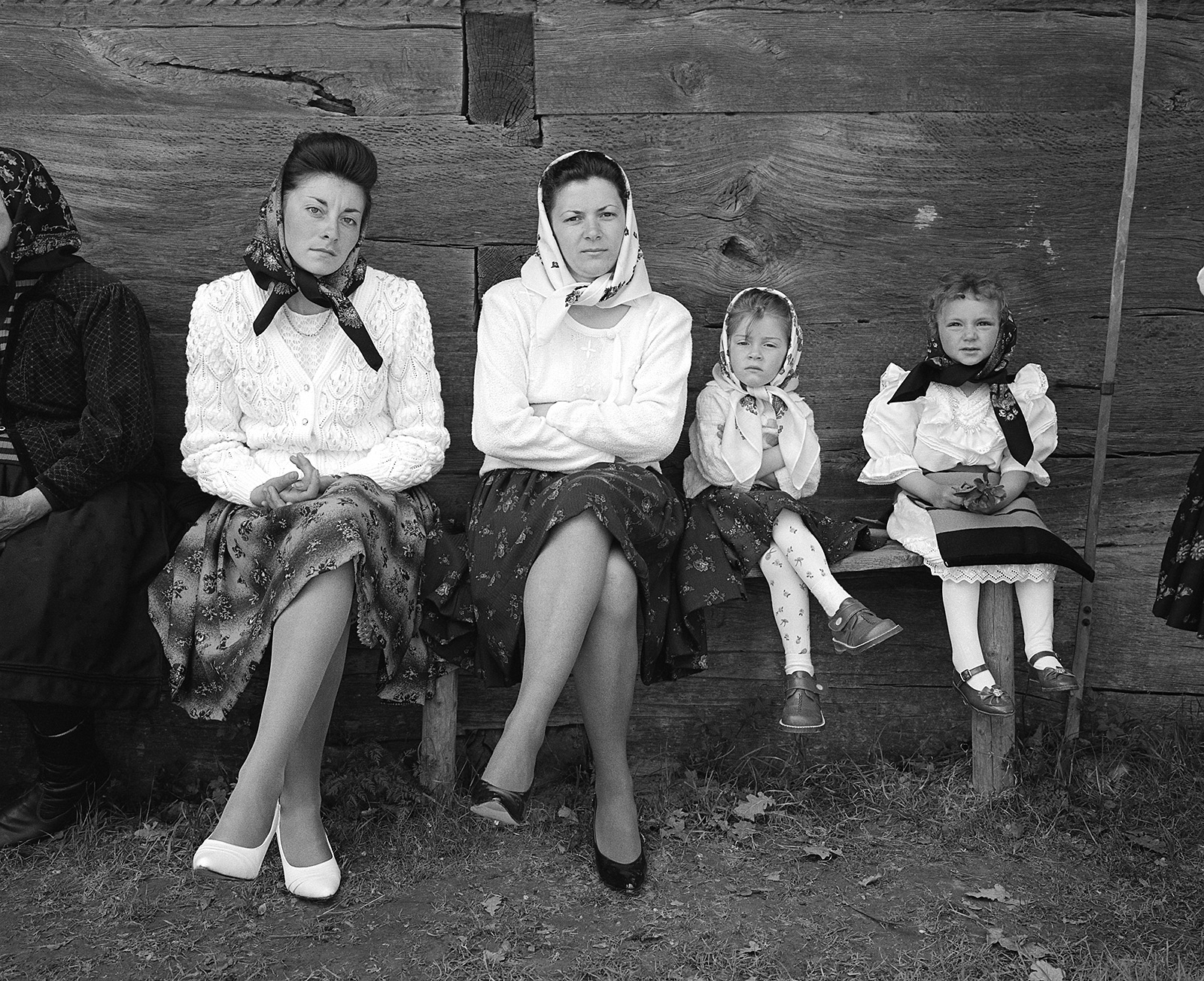
Easter Sunday, Sîrbi
Fashion has changed as women replace the homespun black in their skirts with factory printed fabric and given up their leather and wool opinci -- the footwear of tradition -- for vinyl pumps.
What remains constant is Sunday afternoon, when one learns to flaunt one’s sense of style.
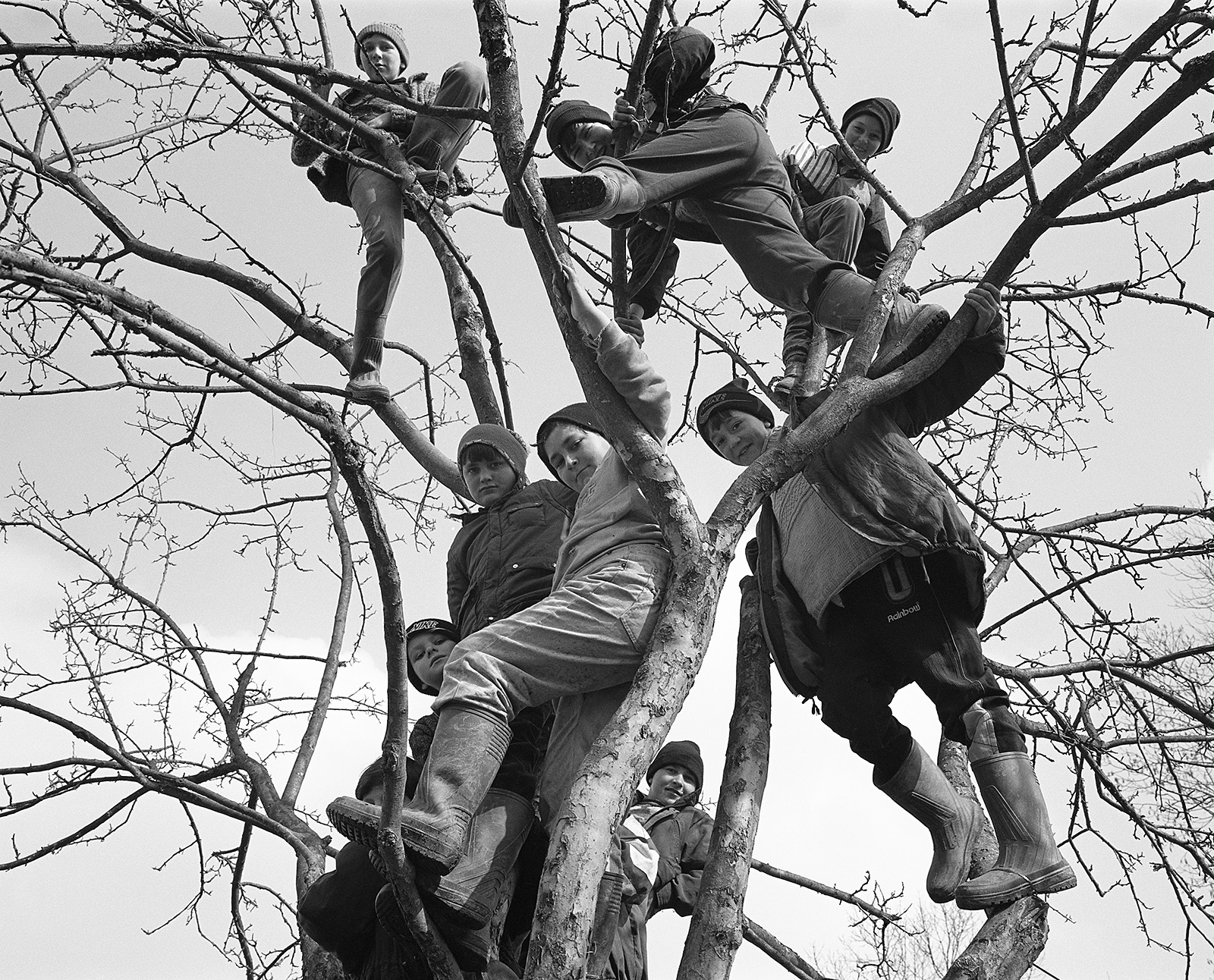
Boys in Trees, Sîrbi
After months indoors, fearing the health dangers of drafts and cold breezes, a balmy day liberates the young boys of the village to run wild.
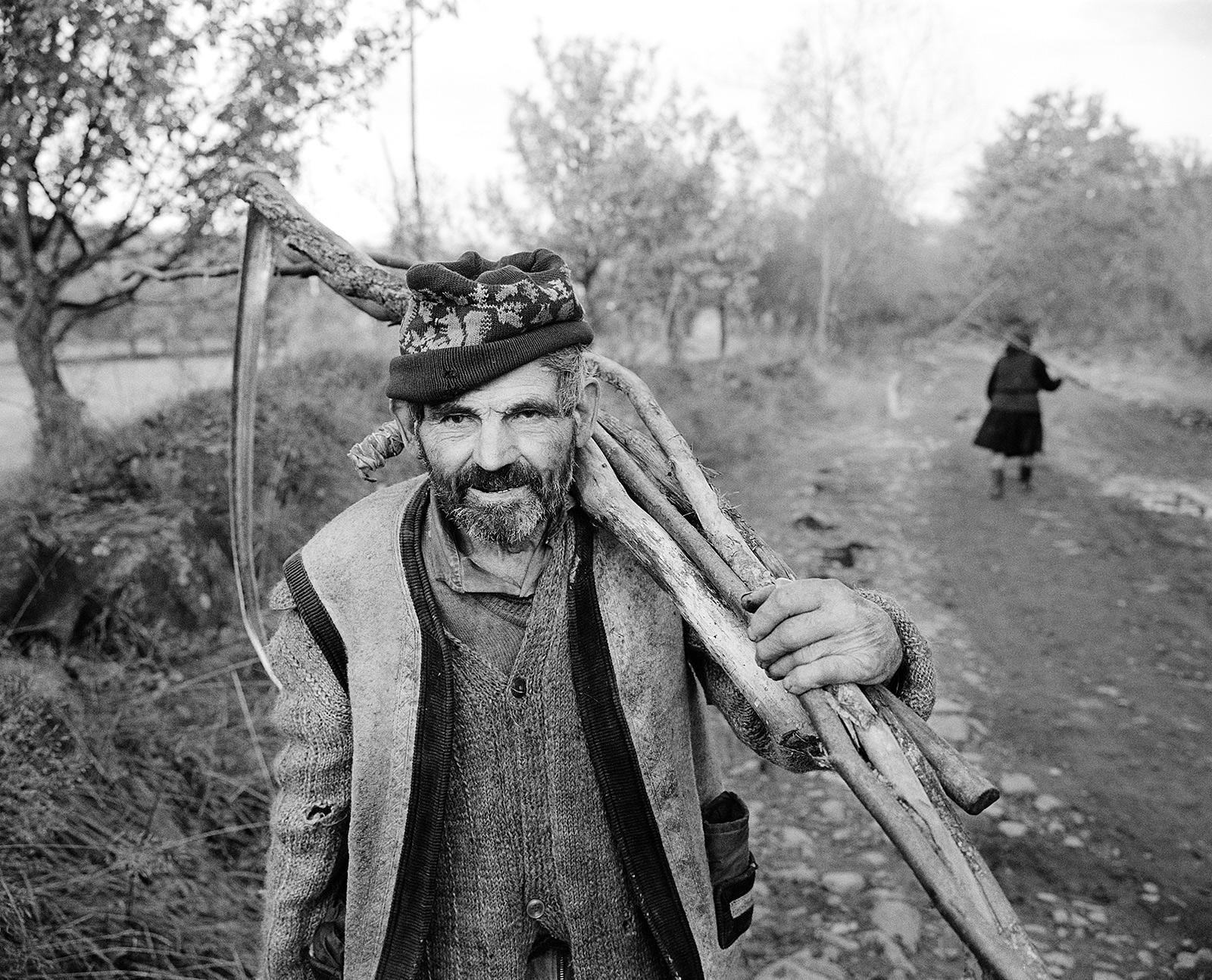
Ion, Glod
Ion made sure we felt welcome in his village. As we passed his home, he rushed inside and emerged with his arms dripping with walnuts. He would not relent until we had stuffed our pockets with them.
When he was a child, walnuts were used as currency for all manner of goods. Even today they are used in trade with the gypsies for pots.

Woodcutters, Mara
Slănina finds a central place in every picnic. Here in the autumn, supply is beginning to wear thin, as the smoked, pork fatback was separated from its pig the previous winter. Yet, even strangers will offer generous hunks to travelers from faraway lands.
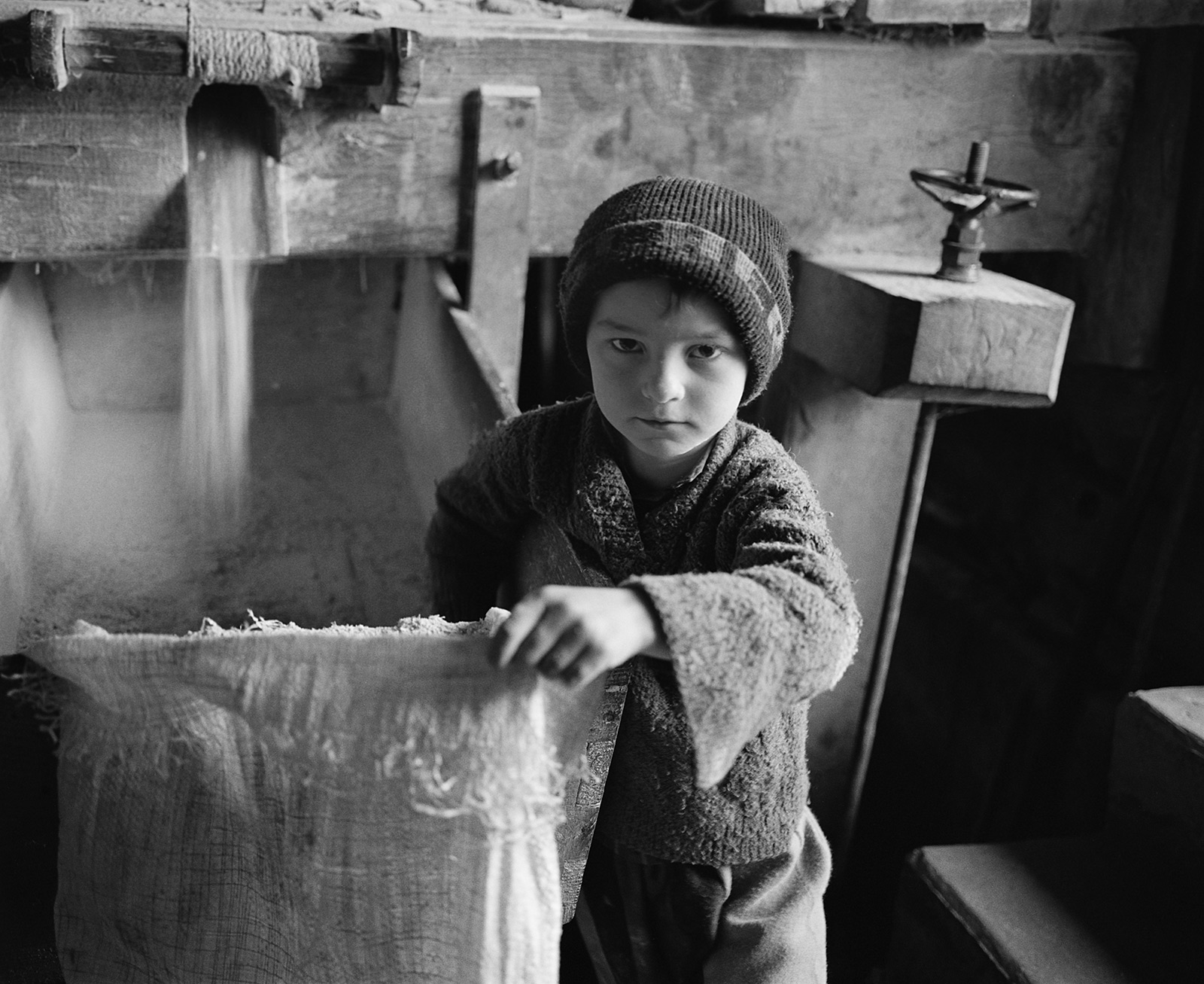
The Miller’s Boy, Sîrbi
Even though only five, Vasile helps out at his family’s mill. First, he adjusts the speed at which corn falls into the millstone to set the cornmeal’s fineness. Then he holds the bag to catch the ground corn.
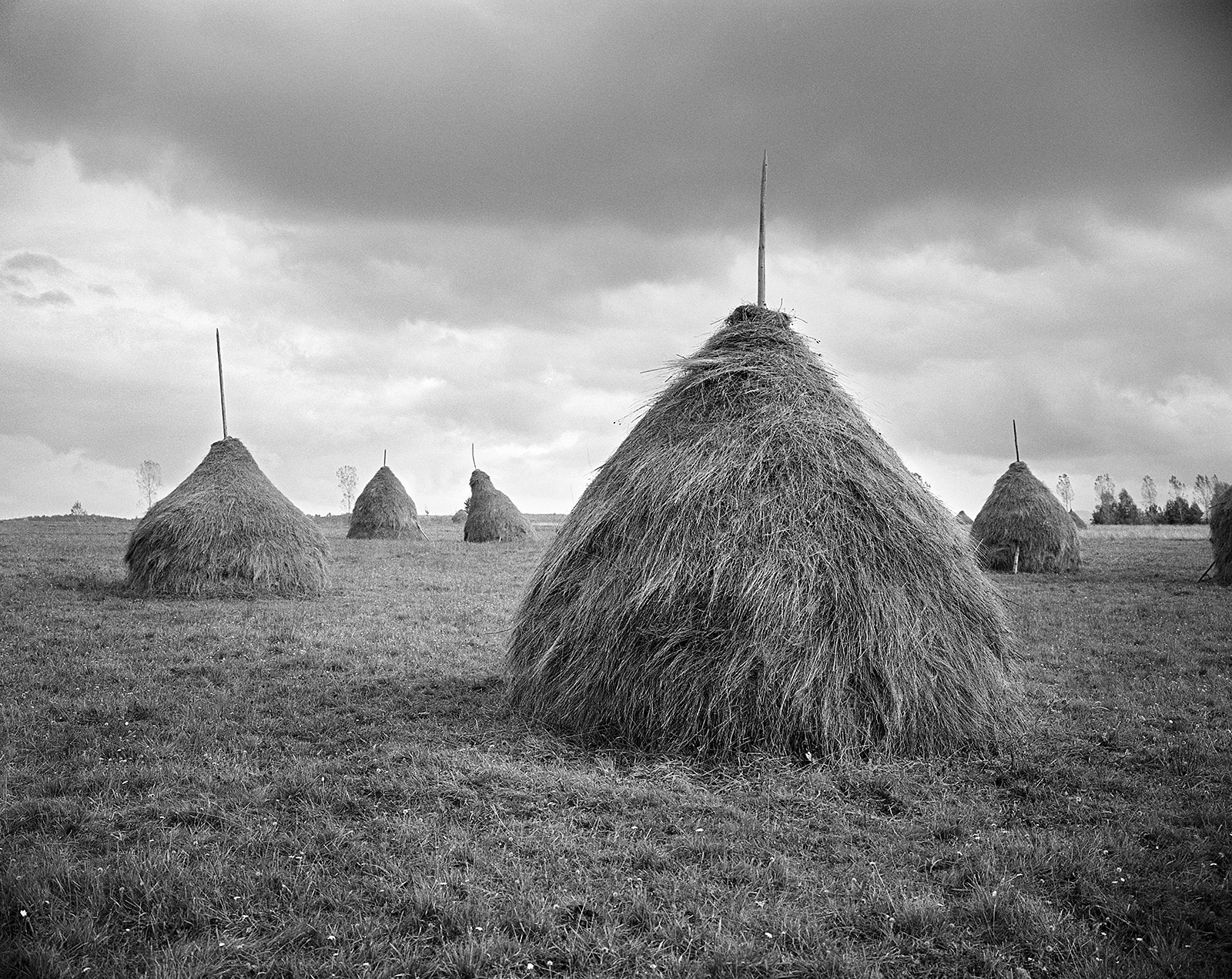
Haystack Village, Sîrbi

Potato Pile, Sîrbi
Potatoes can be stored through the winter in a hole outside under a pile of straw. During the course of the year, they’ll be turned twice and scraped free of sprouts to keep them crispy.
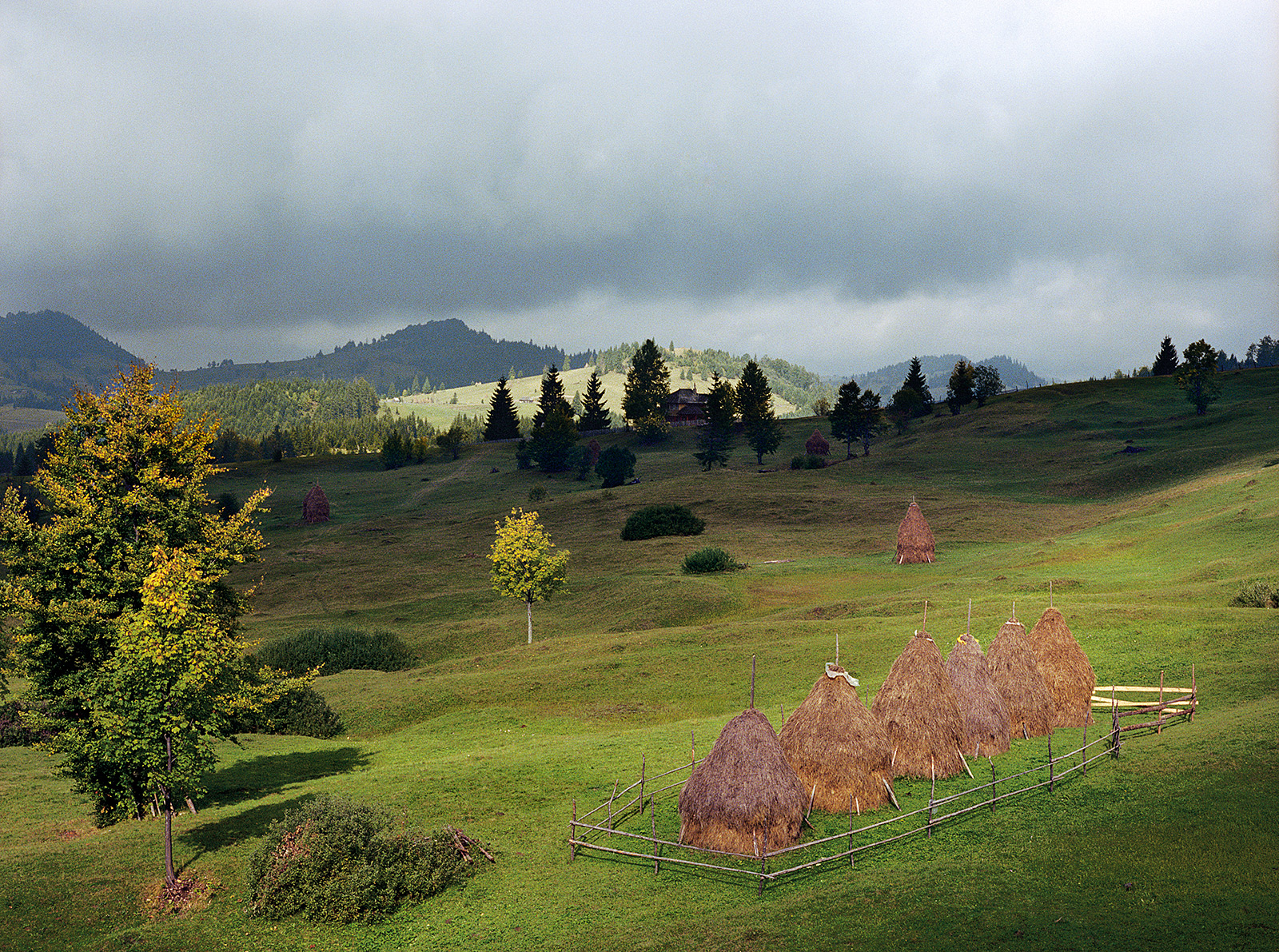
The Field, Maramures
In the wide-open fields, fences are used to keep animals out, not in. These stacks will stand in the field through the grazing season. Haystacks outside the fence must be moved - or become a snack for livestock.
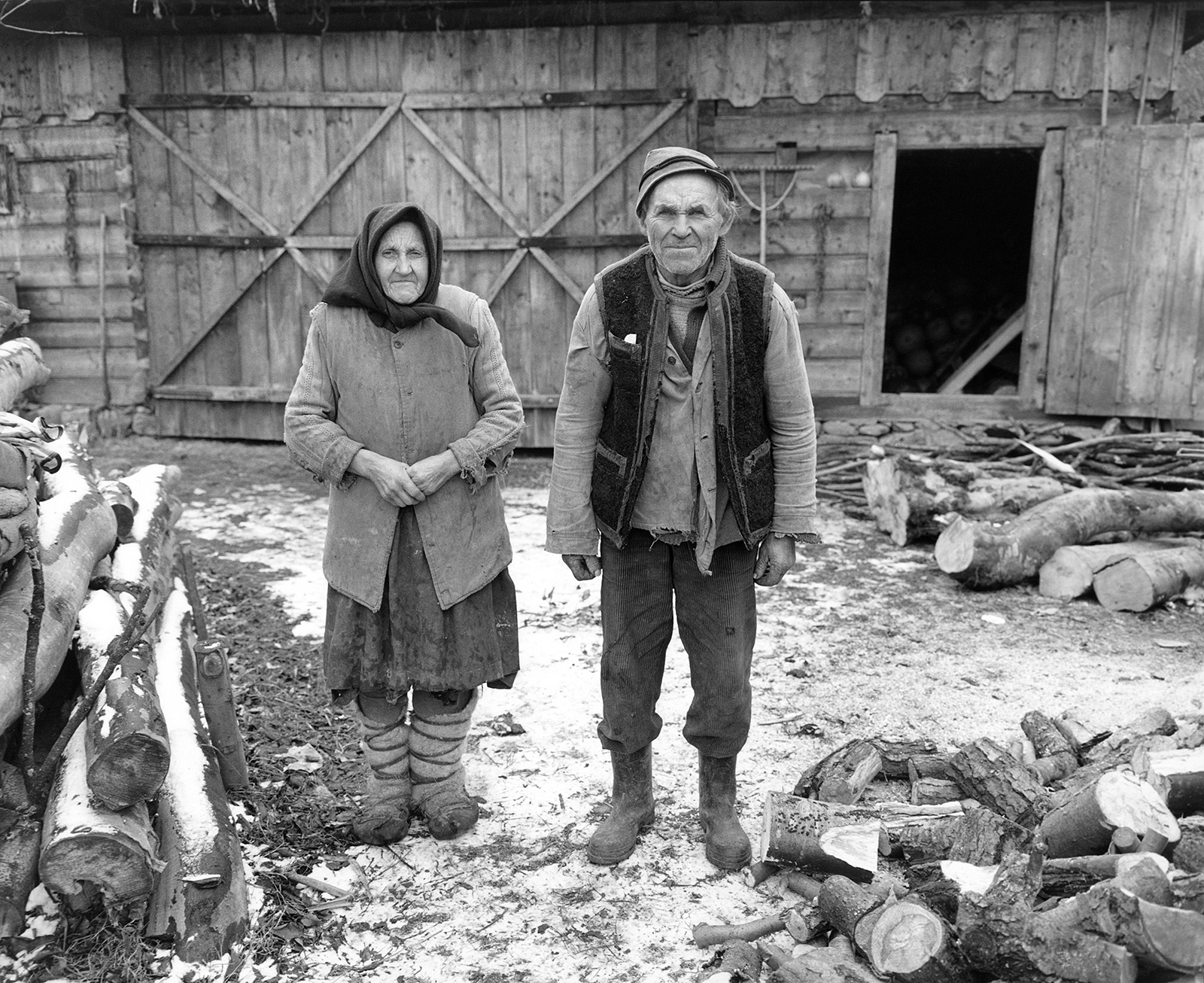
Vasile and Palăguţa Borodi, Budeşti
Romanians from the cities sometimes complain that in Maramureş the people have everything.
“They just go to the woods and get what they need.”
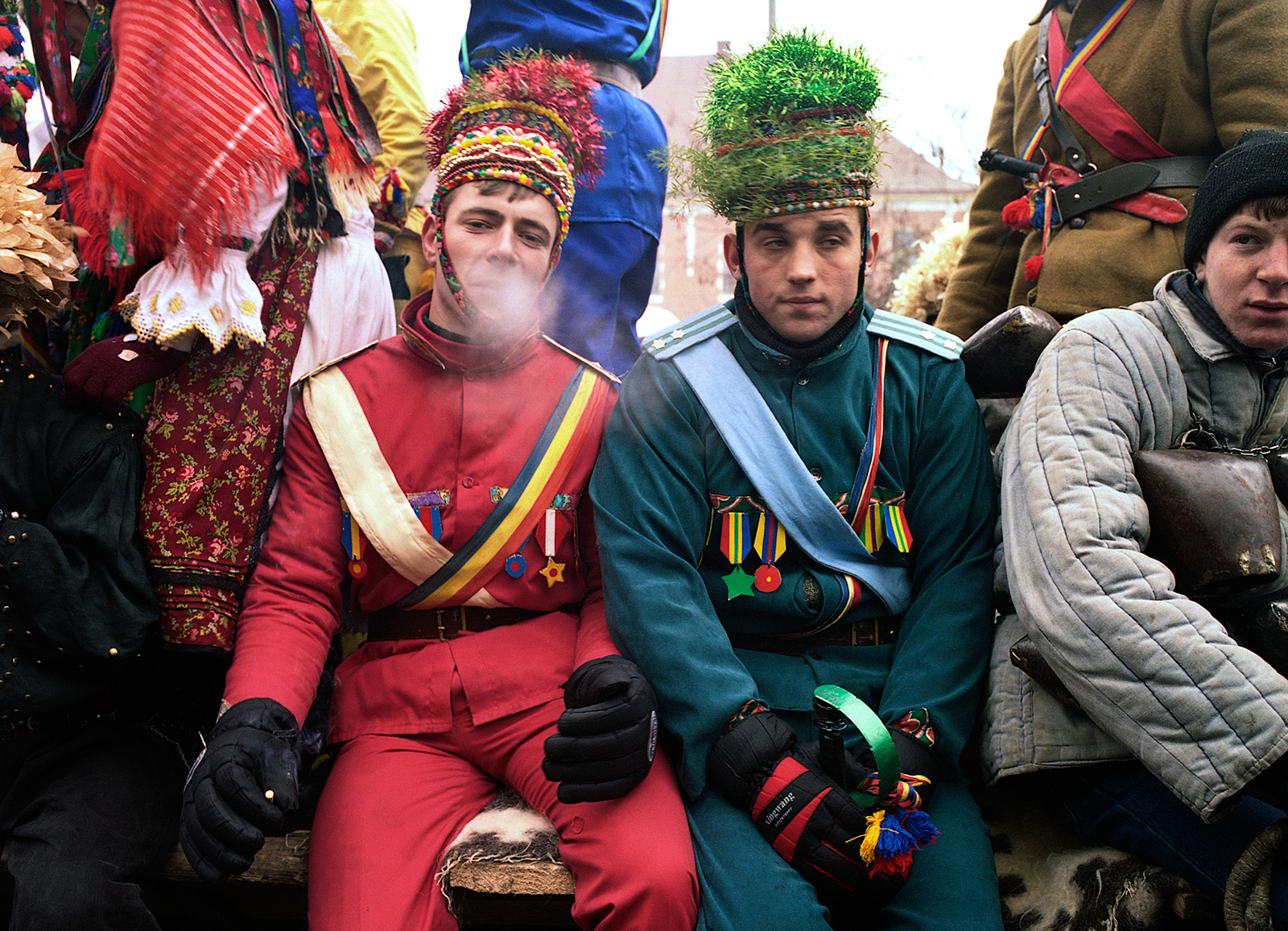
Winter Festival, Sighet
Young people coming to the pagan-inspired Winter Festival can choose to be demon “drac,” or play actors in ritual dances.
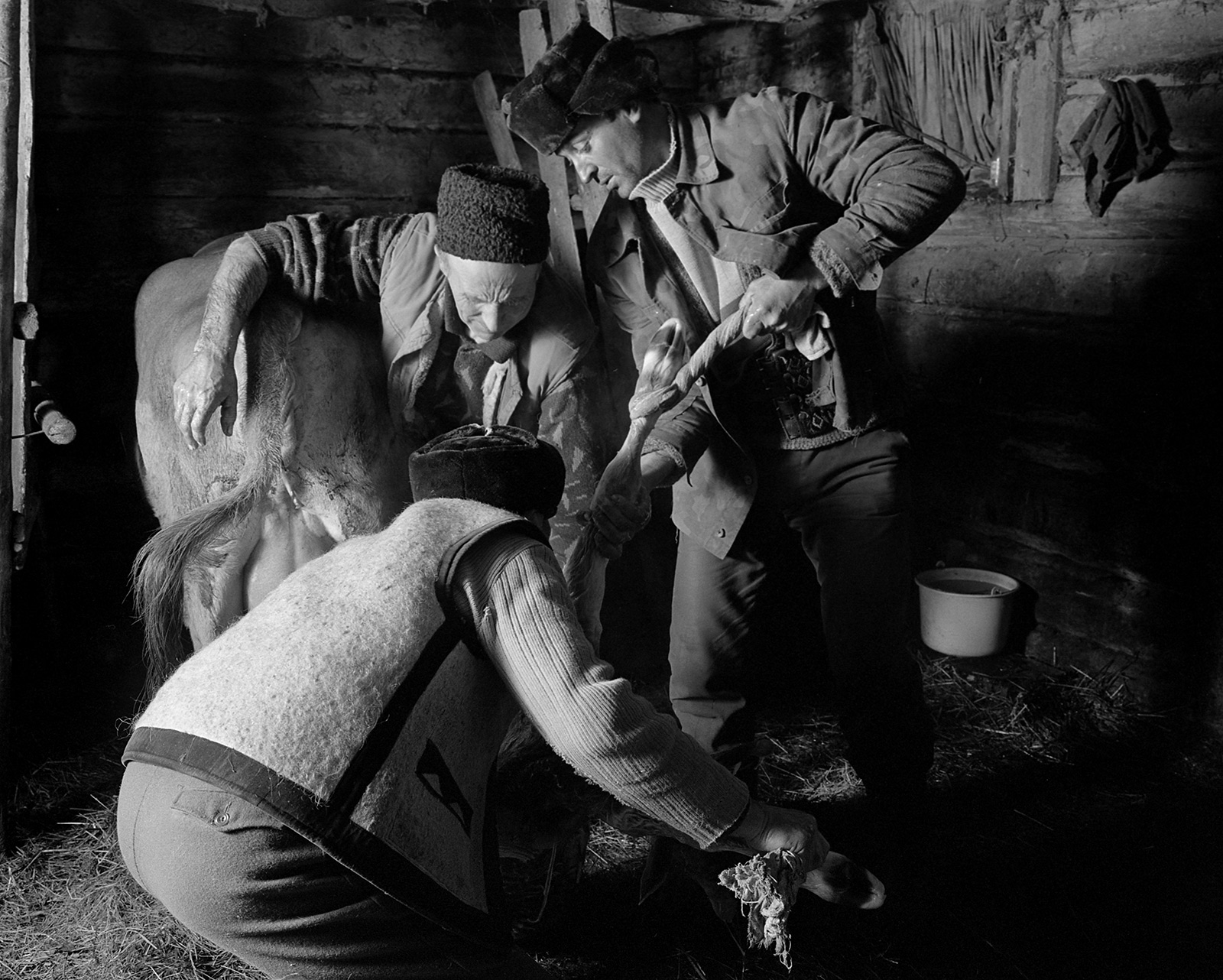
Birth of Florica, Sîrbi
While the birthing mother stands, the family pulls out the steaming calf with the help of towels twined around its hooves. It will stay with its mother for a few hours, then be fed the rest of its life by her owner as a way of insuring there is enough milk left for the family’s needs.
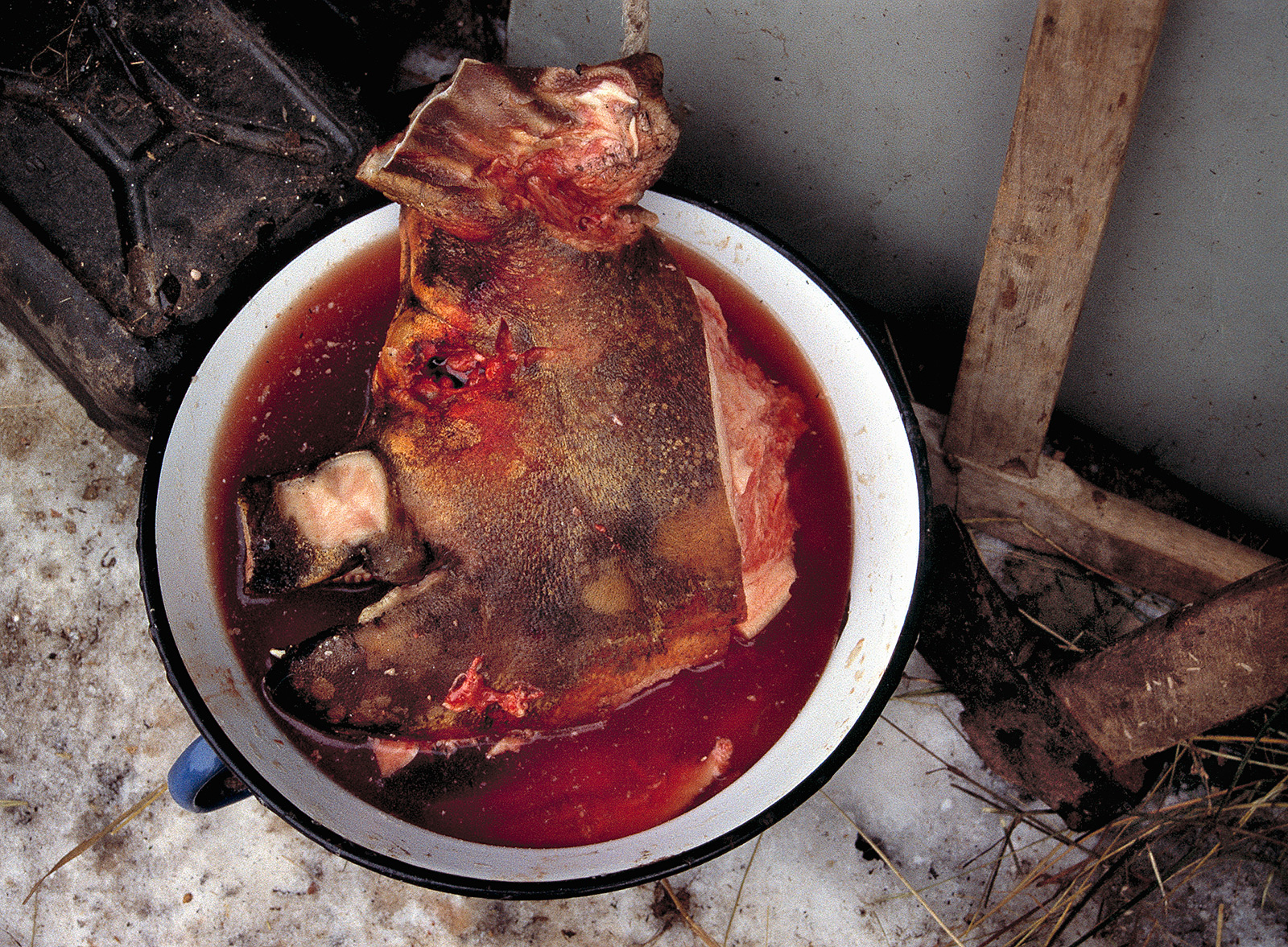
Pig Head, Sîrbi
There is virtually no waste when butchering a pig. Even the cranium is boiled for soup and soap.
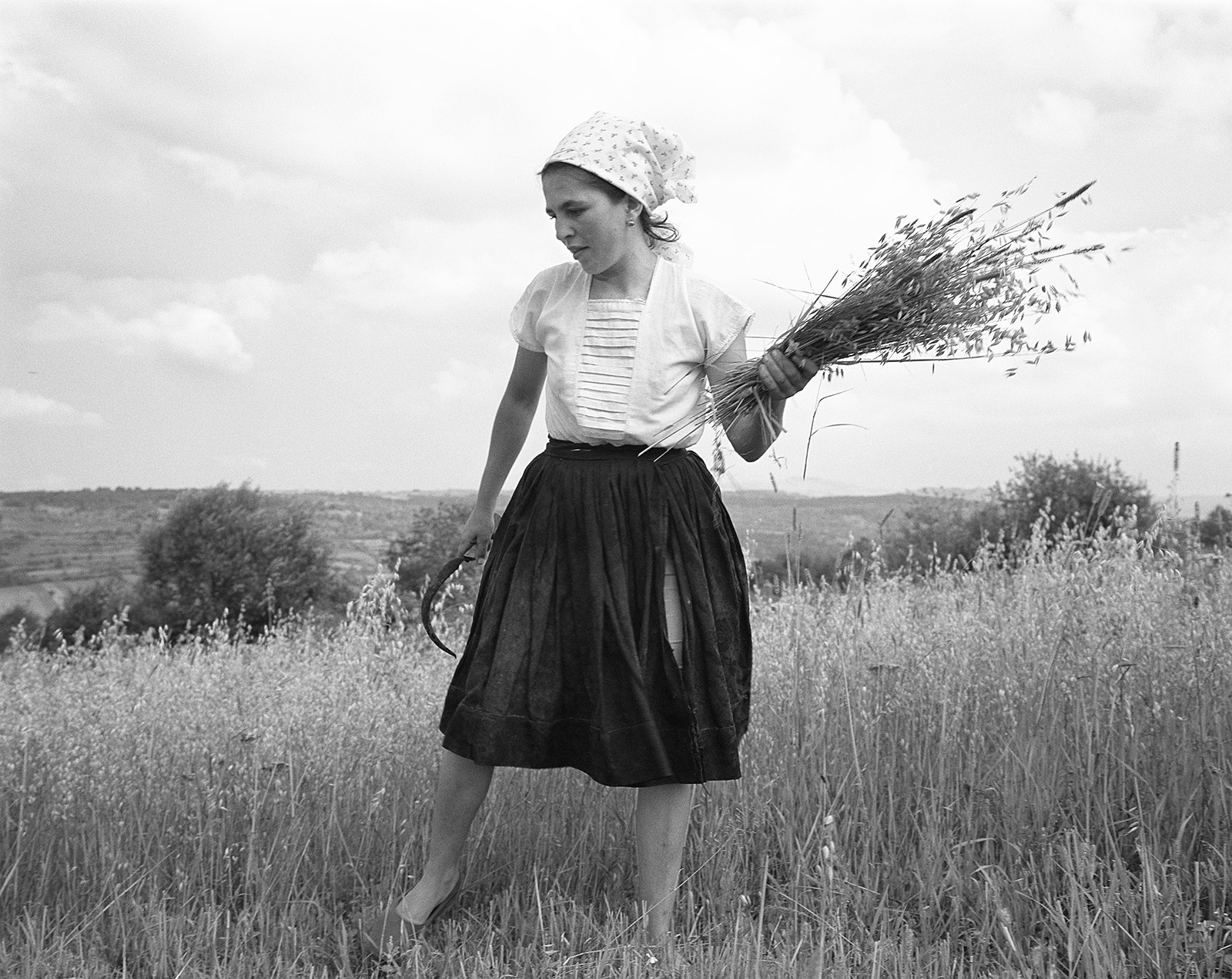
The Harvest, Sîrbi
In August, oat fields paint the landscape with golden rectangles. A family must cut their crop before it is fully ripe, or the seeds will be lost to the earth. To prepare the stalks for being threshed, they first tie them in bundles.
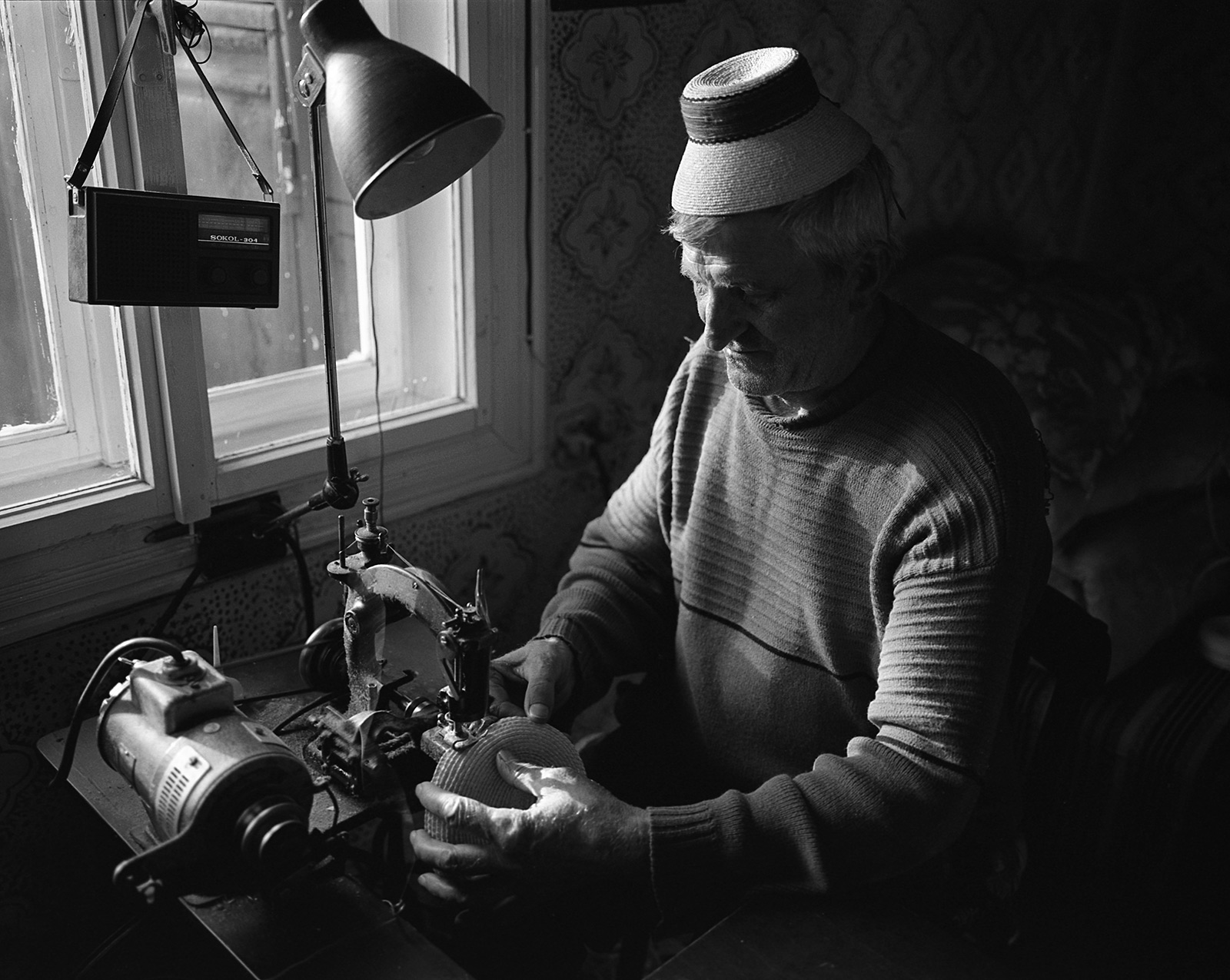
Hat Maker and Storyteller, Sîrbi
Hats are sewn from ribbons of woven straw. This traditional “clop” hat maker, Ion, trades with a distant Saxon village for his materials. “They are the only ones who still use old straw and know how to make the weave tight and soft.”
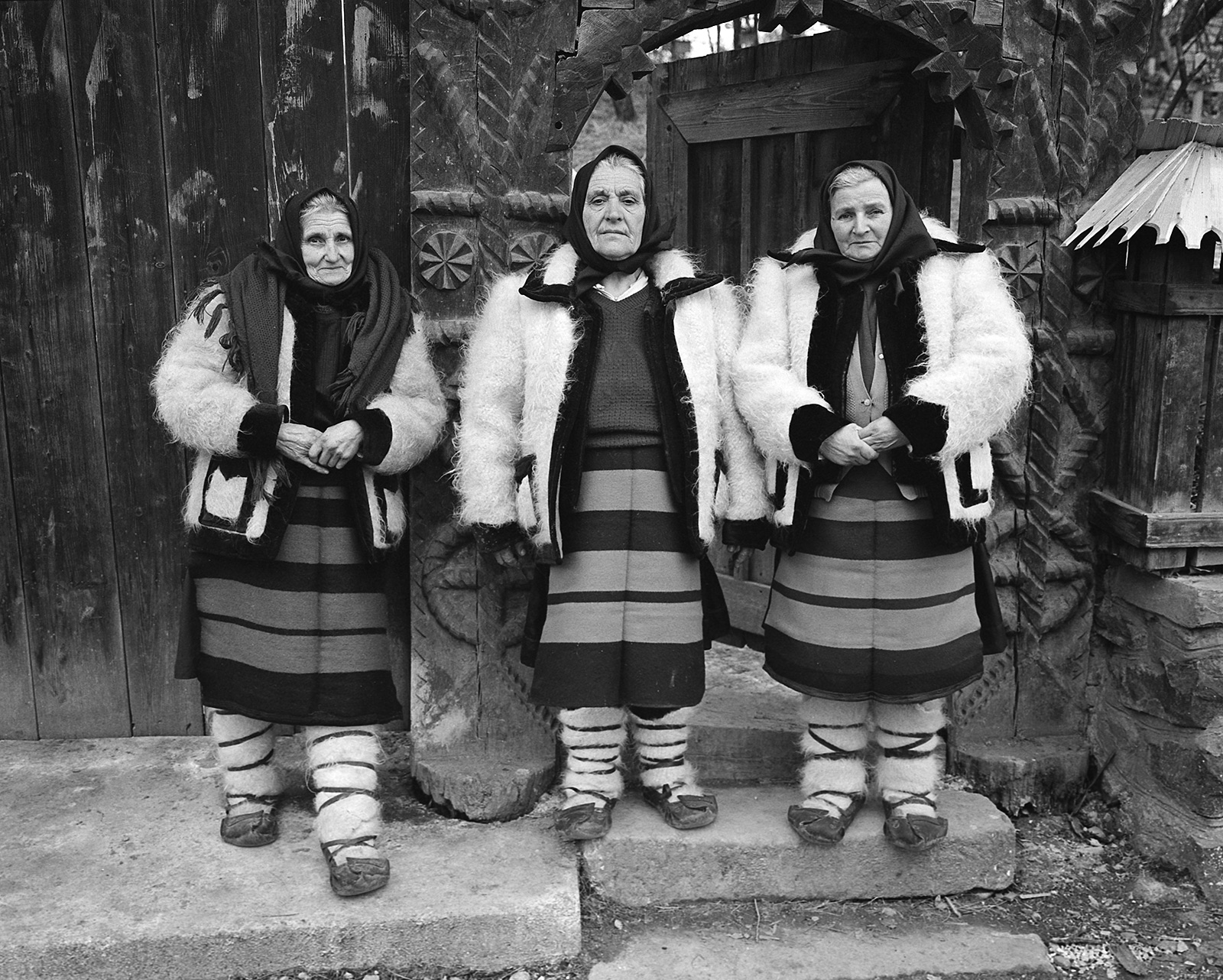
Three Bătrîne, Budeşti
Little girls and grandmothers wear the square hand-woven aprons called zadii. Older folks of both sexes wear the wool wrappings around their shins, called obdeli, which are tied in place by thongs on their pointed shoes, called opinci. Though these shoes are now made from old inner tubes and car tires, they are still recognizable as footwear that predated the Romans.
They dress in their finest on Sundays and religious holidays. A Maramureşancă (Maramureş peasant woman) knows that city folk do not dress or believe as she does. Even though those people may command more respect, she is certain that her way is proper for her and her family.
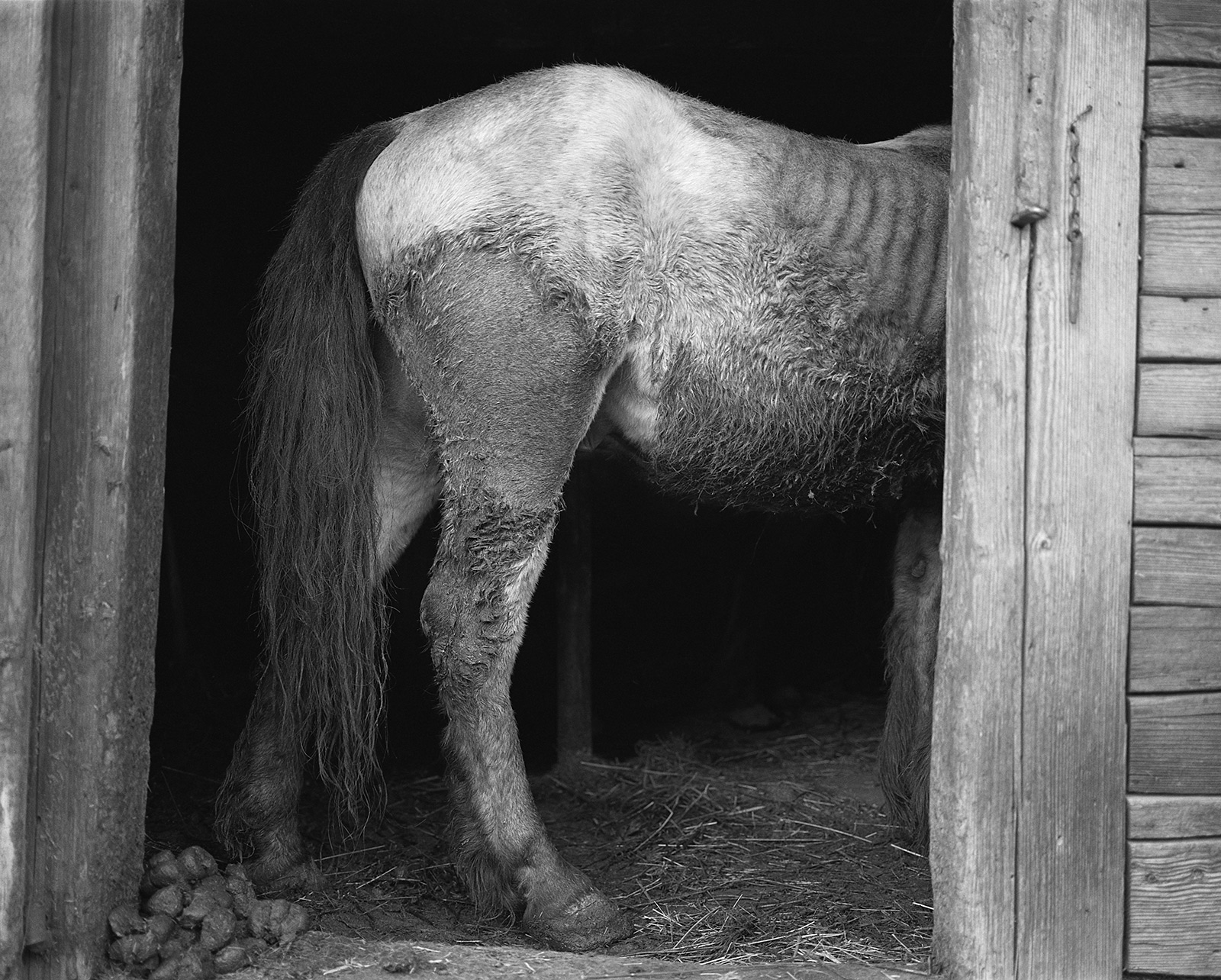
Demian’s Horse, Sîrbi
When a farmer takes his horse out into the world, he fastens red tassels to his harness. Should harm befall him, it would mean great hardship for his family. “If my horse breaks its leg, I can’t even eat it.”
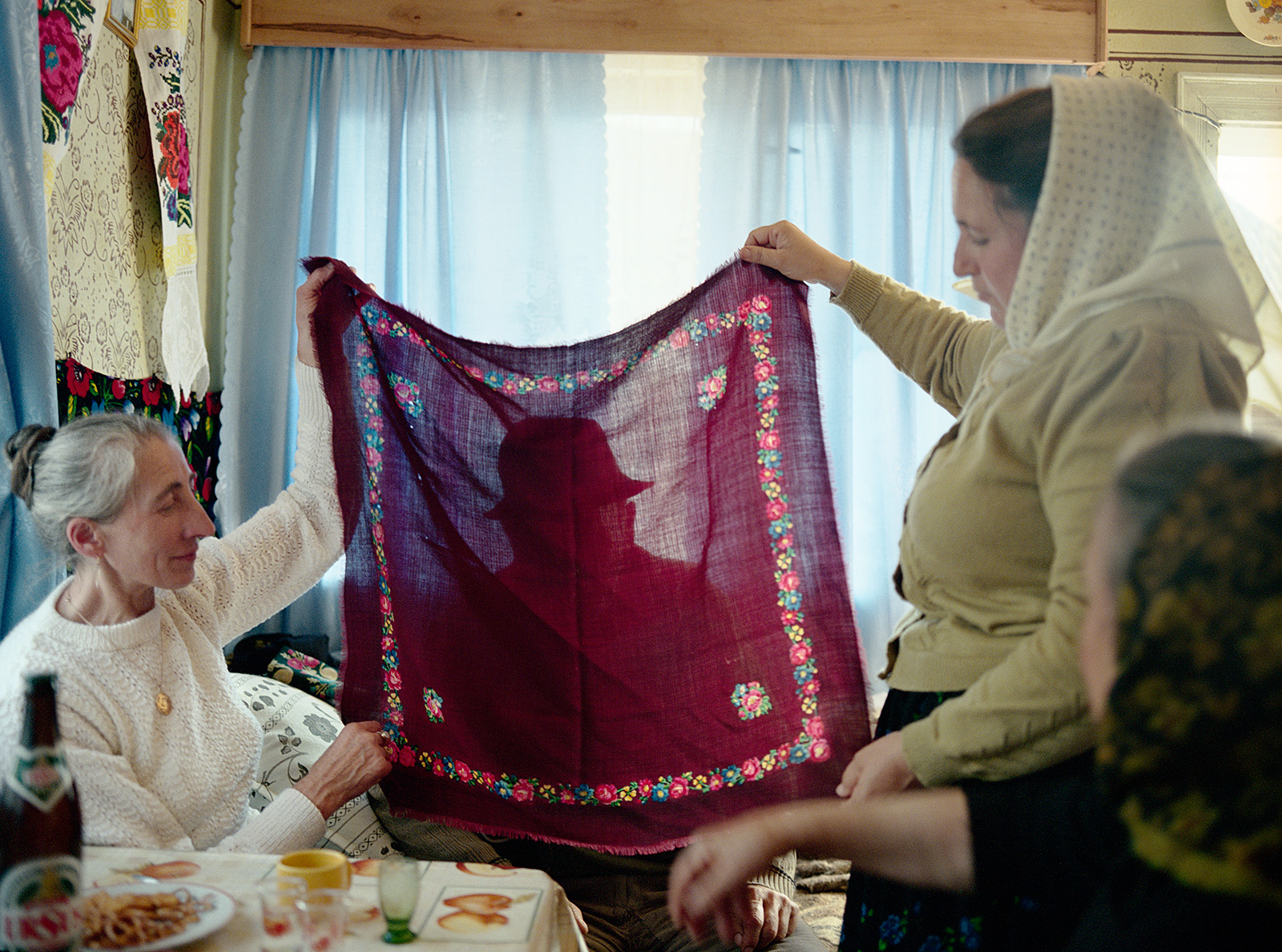
Headscarf, Sîrbi
After years of idolizing all that is new, a sudden shift made old headscarves the “it” fashion item. And suddenly an older aunt’s forgotten linens are rediscovered family assets.

Wedding Couple, Bogdon Voda
Ten in the morning. The wedded couple takes a break outside from the twenty-four hour wedding cycle which has already included yesterday morning’ preparations, a town procession, a religious ceremony, a banquet, and continual dancing, which still carries on inside.

After the Funeral, Văleni
After the body is buried, mourners return to the deceased’s home for the feast. Because a funeral service typically lasts four hours, appetites have peaked. No manner of bad weather will discourage the crowd.

Easter Bread, Sîrbi
Easter marks the changing of everything. Spring demonstrates the earth’s resurrection in imitation of their Lord’s. Greetings change from “Good day, where are you going?” to the formal exchange: “Christ has risen!” followed by the response: “Truly He has risen!”
For women, it is an annual opportunity to show their artistic flair as they rival the gate carver with decorated bread.

Private Dirge for Anuţa, Breb
The first duty when finding a dead body is to light a candle to frighten away the spirit of death. Three days of funeral preparations follow. Villages have no undertakers. Families prefer to dress their departed themselves. Anuţa’s cousin cries out a sing-song mourning dirge, her relatives prepare for the priest and the village waits in her courtyard outside. She cries the words of ‘mother’ as they do when mourning all women.
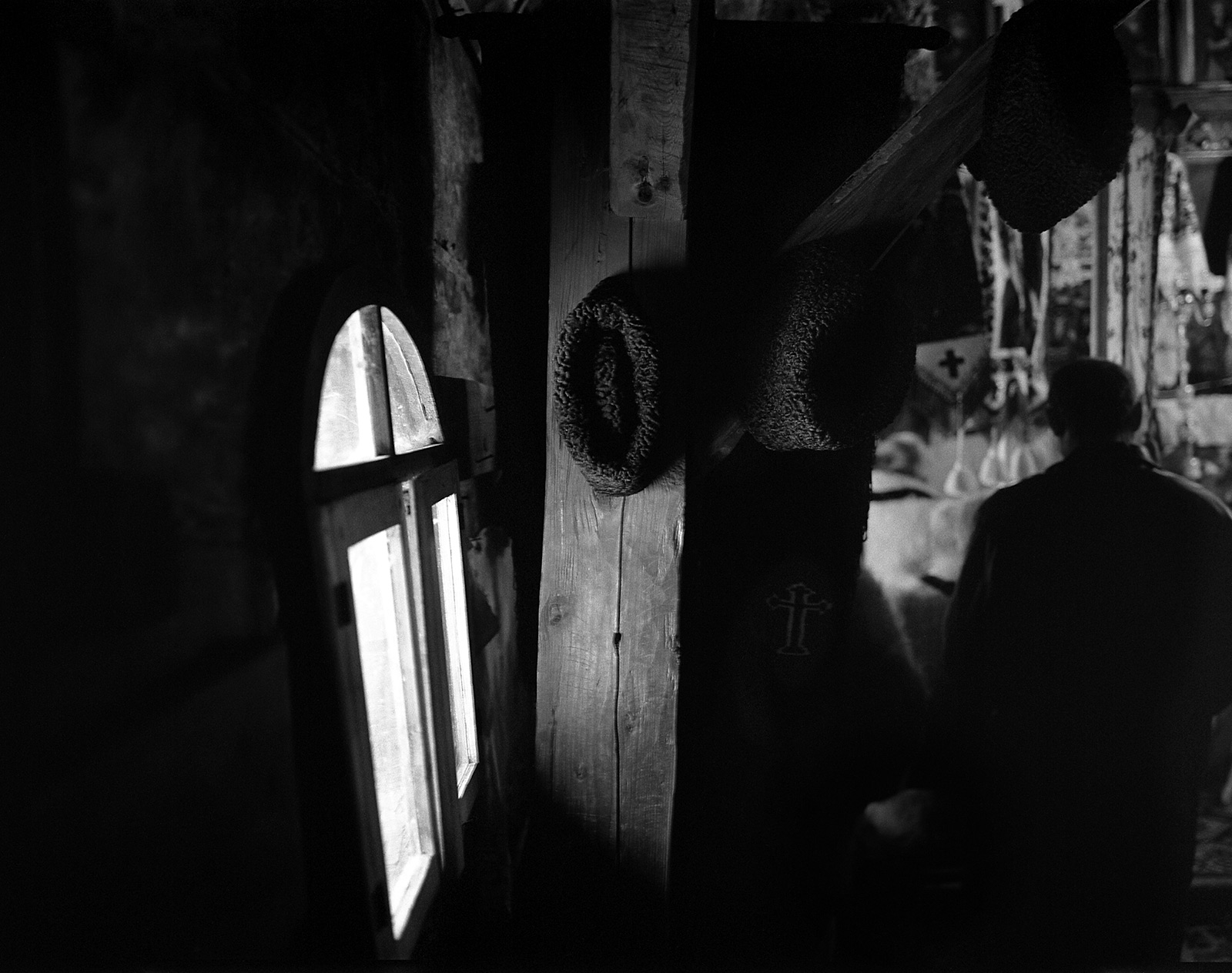
Sunday Worship, Sîrbi
Tradition runs deep in villages with five-hundred-year-old log-cabin churches. Where a man stands for service and where he puts his hat, are privileges passed down through inheritance.

Women in Back, Sîrbi
In Maramures, Orthodox churches are divided in half. The front half is for men, while the back and outside are for women.
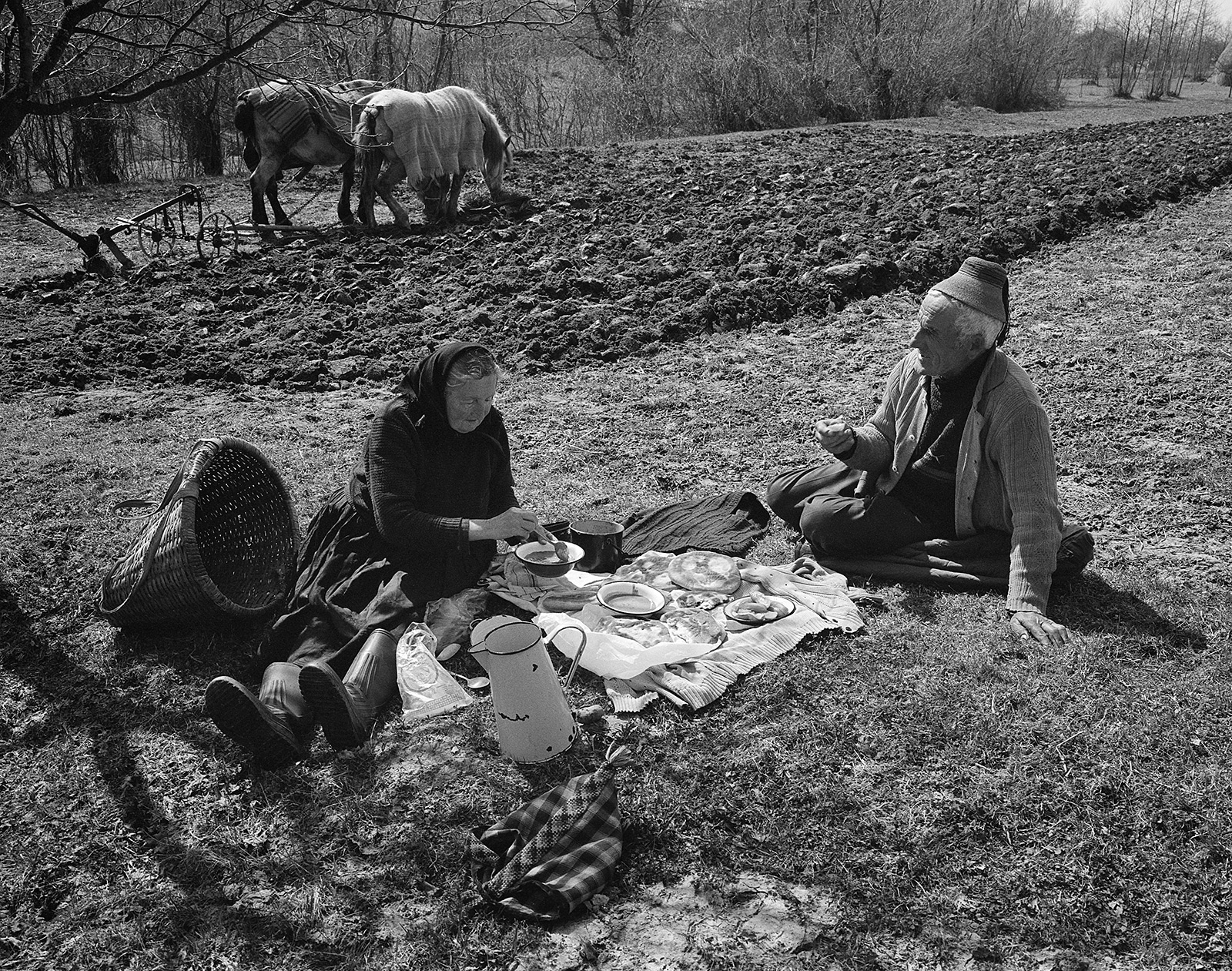
First Plowing, Sîrbi
A good man will plow more than an acre in a day. A good woman will be sure his fried bread and soup arrive at lunchtime - still hot from home.
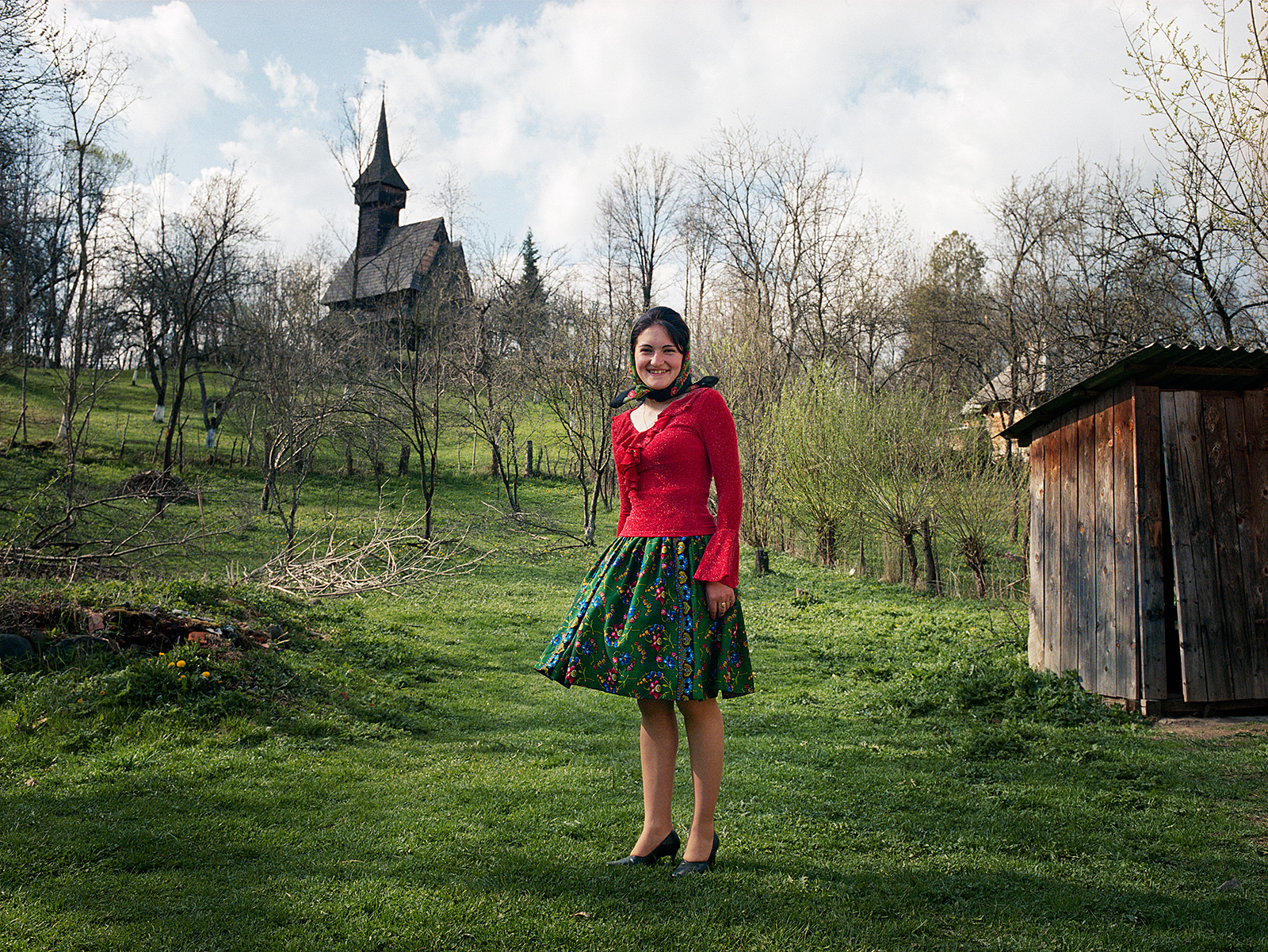
Maria, Sîrbi
The nearest high school to this village is an hour by bus. Two years ago, a majority of children stopped their education at the eighth grade. Now, a majority spends the school week with relatives in Sighet working toward a diploma.

Cocon, Sîrbi
Petruc will soon begin helping his father wrangle horses in summer and carry water from the frozen river in winter. As he grows, his hands will become large and callused from hard work. Yet his mother will never let him go outside without covering his head.
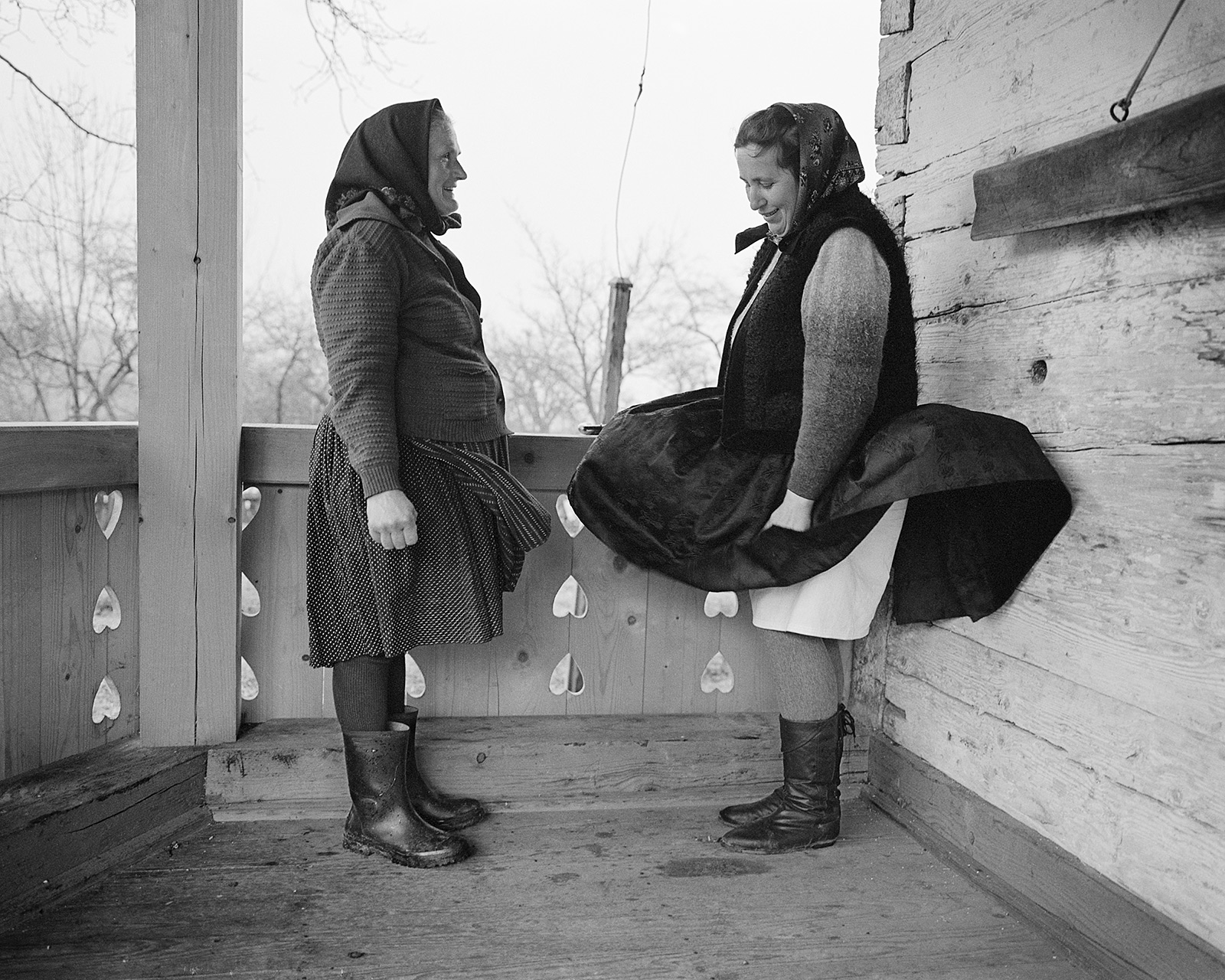
Spring Storm, Glod
Good gossipers know when to exaggerate, when to tell the truth, and when to pretend they saw nothing.

Cleaning their Church, Rozavlea
Each village has an annual pilgrimage claimed as their special event. Peasants from many surrounding villages will attend service at Rozavlea’s church in honor of Saint Maria’s birthday.
The women of Rozavlea know their friends in other villages will have a critical eye toward
cleanliness.
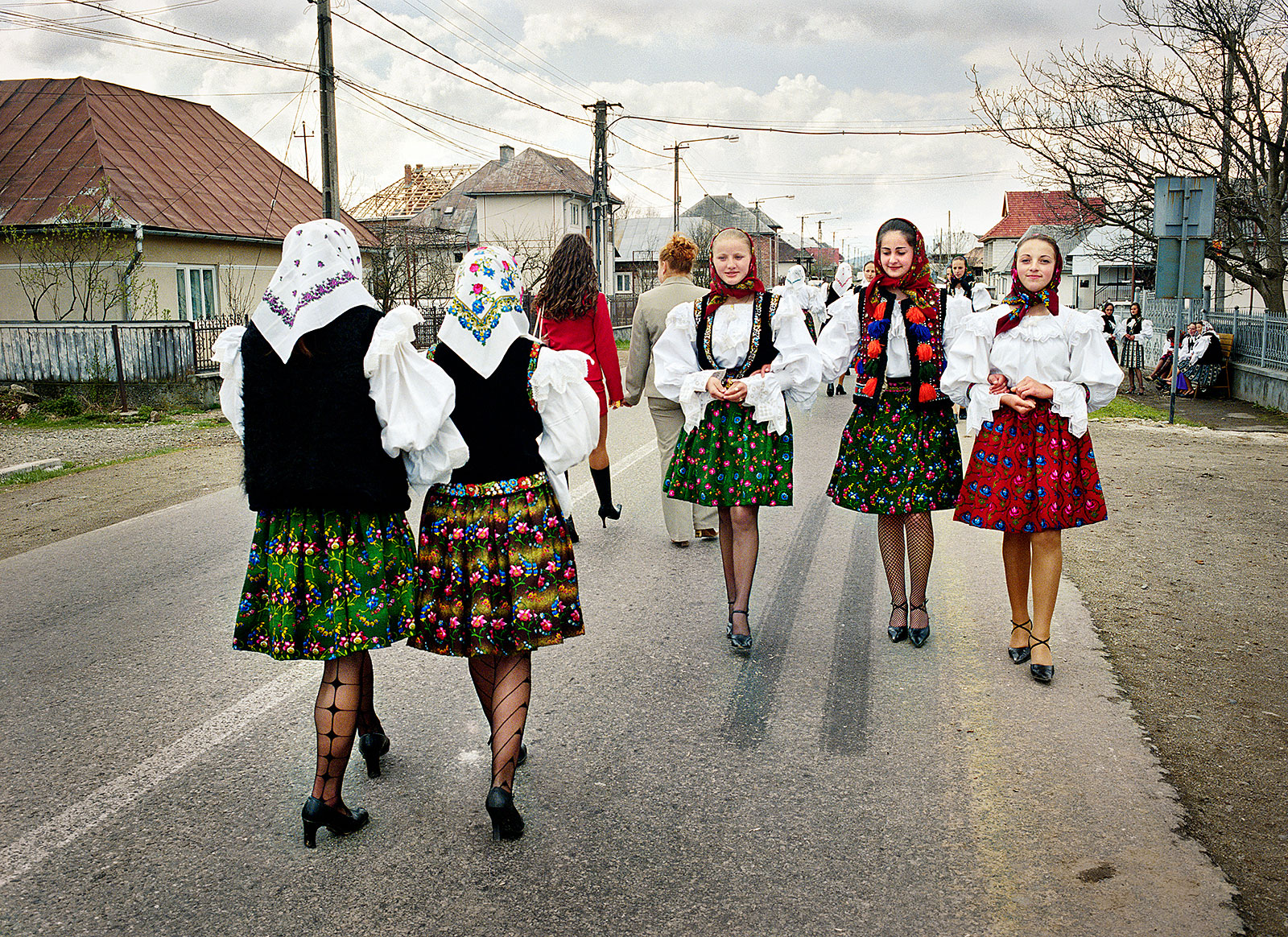
Sunday Stroll, Berbeşti
Villages maintain individual traditions. After Easter, the girls of Berbeşti spend a full afternoon circulating on the village road to strut their stuff.
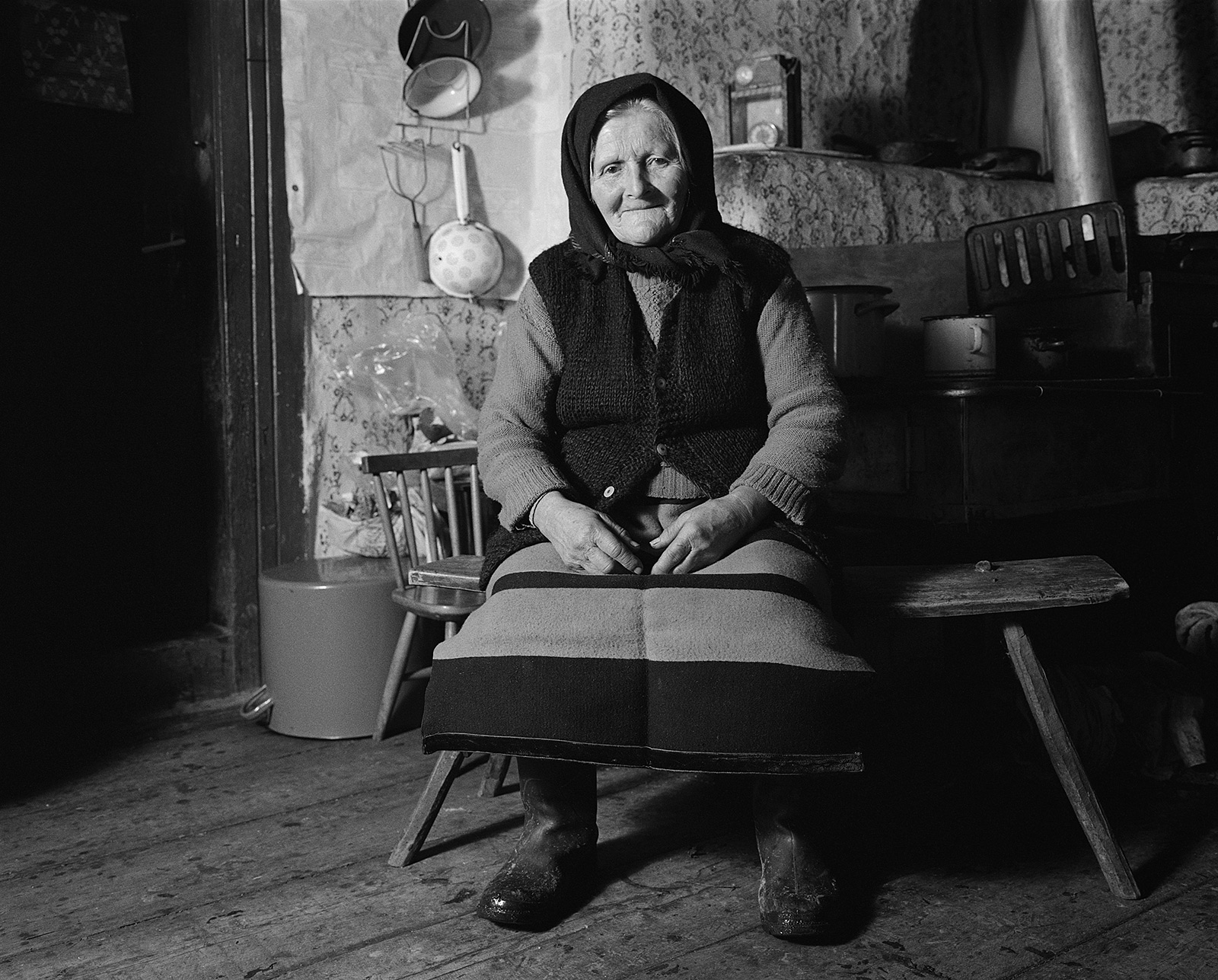
Ileana Doca, Sîrbi
“I’m only one person now, and I have to do everything. Feed the pig, make the food, and clean the clothes. I find a way to do everything, yet I can’t die.
Life will be better when I’m dead.”
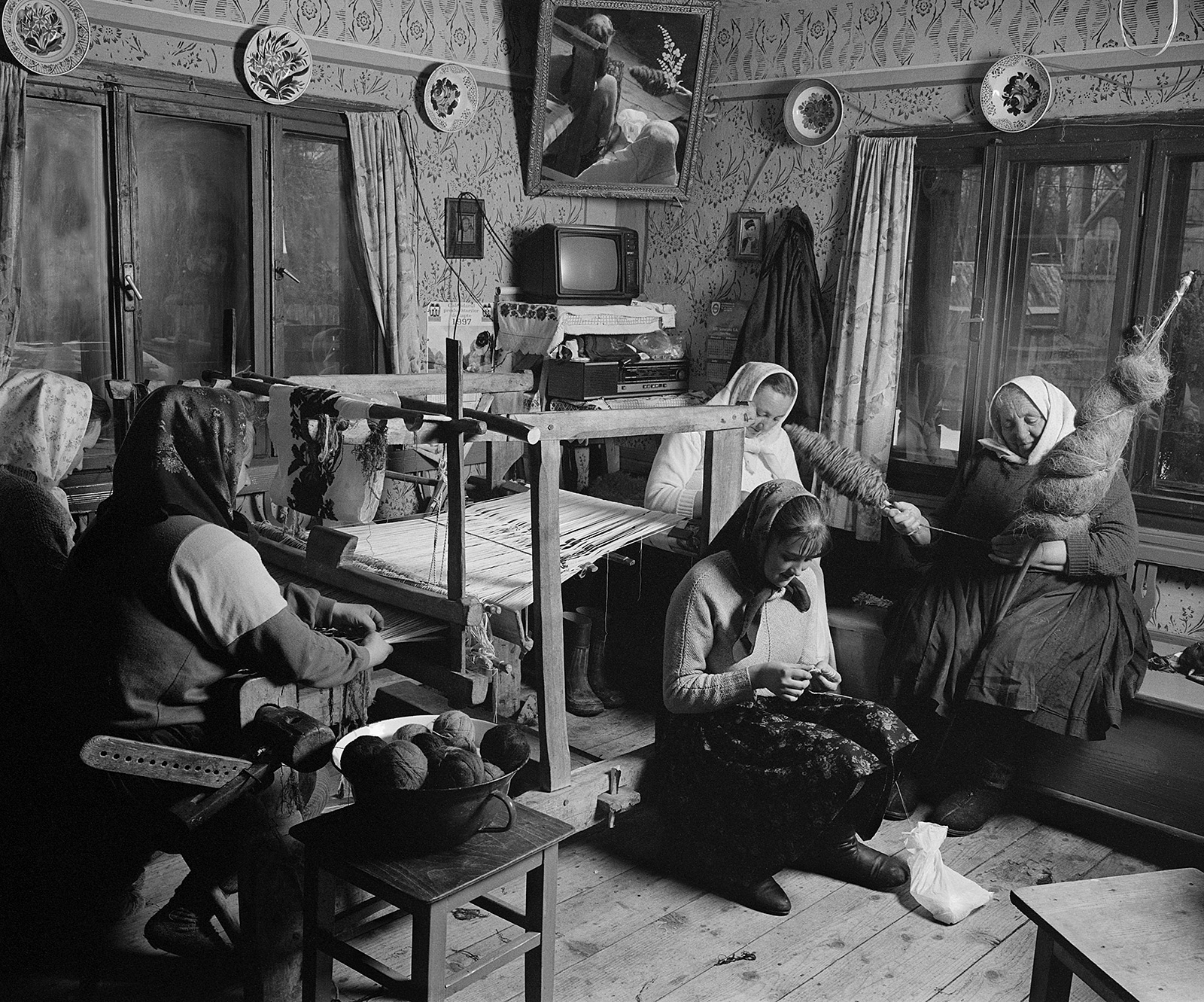
The Weavers, Sîrbi
In summer, the family loom lies jumbled in the barn like a heap of broken scythe handles. But in winter, it is time for women to maintain the family’s supply of woven wealth, and for a young woman to begin creating her dowry. The loom takes shape in the family living space and its shuttle again flies for hours a day.
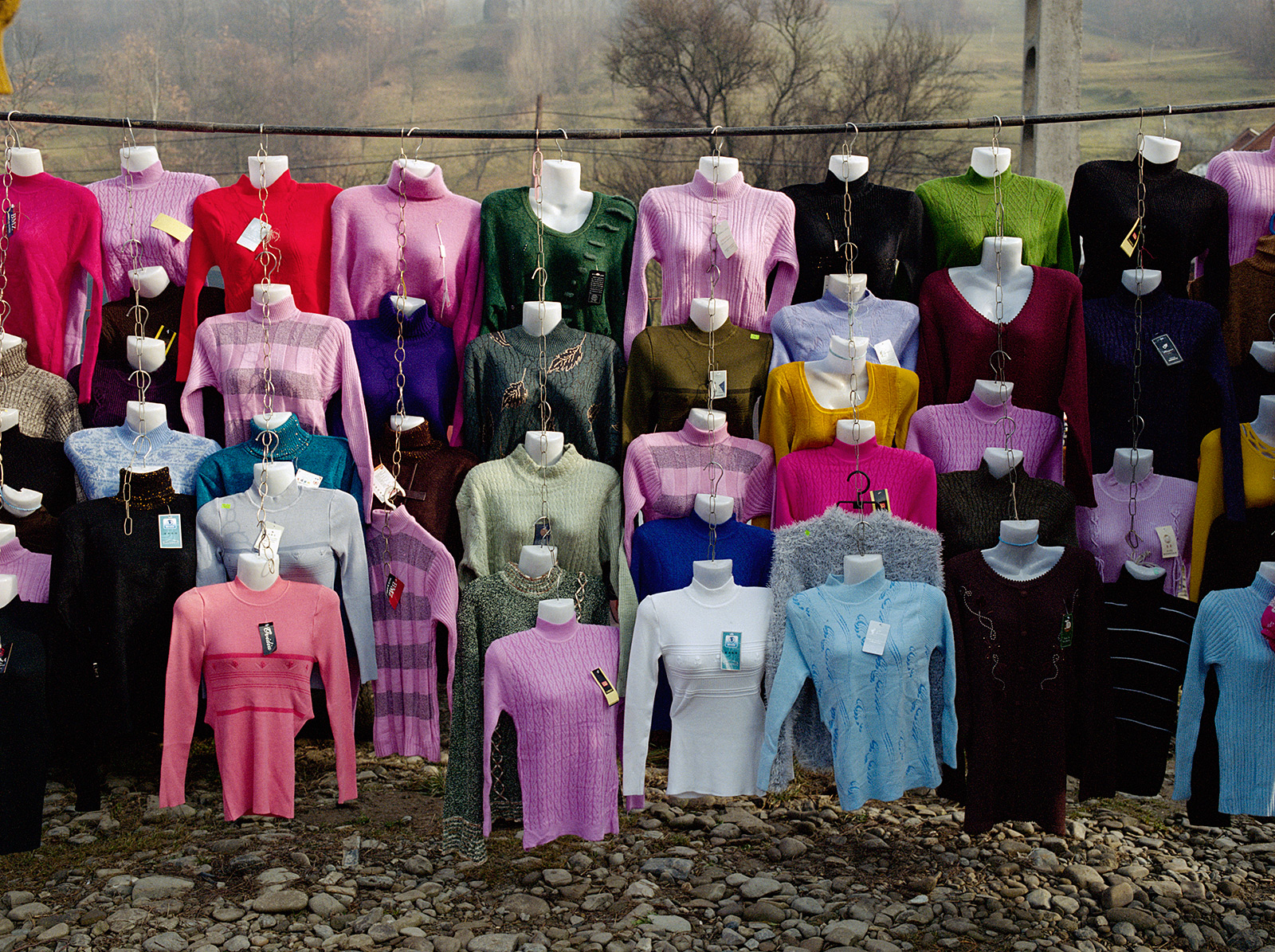
Shirts, Negreni
There are many girls who grow up to adopt the old peasant look. But almost every woman goes through teenage years of flash.

Petru and the Claie, Sîrbi
The quality of a haystack can be told by its color. The quality of a man by the time it takes him to bring one home.
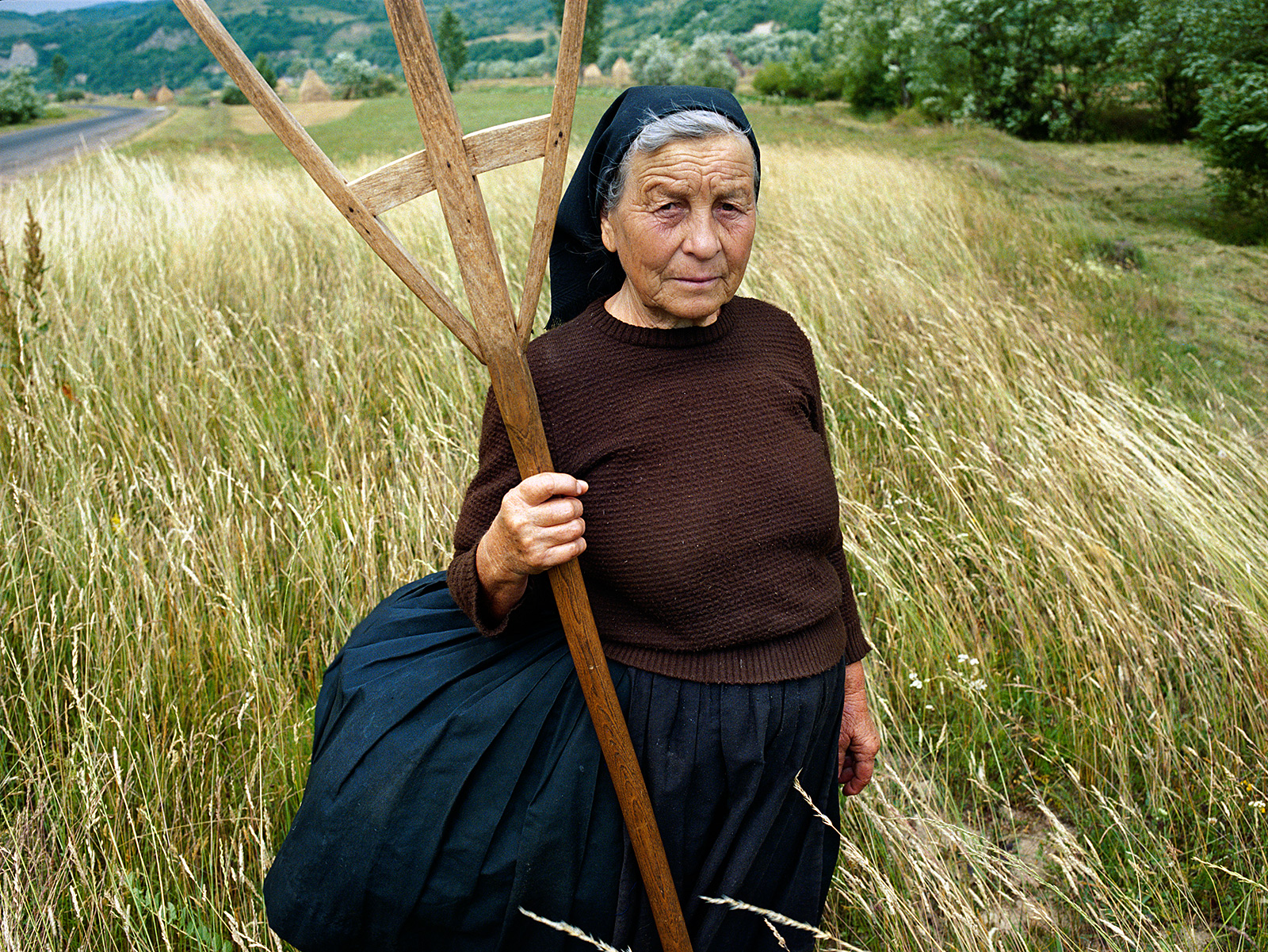
Tiranca, Sîrbi
Black cloth is the mark of a widow. She will wear something black every day she remains on earth until God decides she should join her husband.
Making a Haystack, Sîrbi
At the turn of the millennium, for a year of days beginning in the autumn of 1999, Kathleen and her husband Henry lived in a remote village, in the Maramures region of northern Transylvania, Romania. This region is unique amongst the former Soviet Bloc for the way it preserved its way of life. After World War II, for forty years of communist rule, a few valleys in Maramures escaped collectivized farming because of poor soil and hilly landscape. In the post cold-war period, preservation continued because of pervasive impoverishment which slowed the advancement of modernity into the reaches of northern Transylvania.
Easter Sunday, Sîrbi
Fashion has changed as women replace the homespun black in their skirts with factory printed fabric and given up their leather and wool opinci -- the footwear of tradition -- for vinyl pumps.
What remains constant is Sunday afternoon, when one learns to flaunt one’s sense of style.
Boys in Trees, Sîrbi
After months indoors, fearing the health dangers of drafts and cold breezes, a balmy day liberates the young boys of the village to run wild.
Ion, Glod
Ion made sure we felt welcome in his village. As we passed his home, he rushed inside and emerged with his arms dripping with walnuts. He would not relent until we had stuffed our pockets with them.
When he was a child, walnuts were used as currency for all manner of goods. Even today they are used in trade with the gypsies for pots.
Woodcutters, Mara
Slănina finds a central place in every picnic. Here in the autumn, supply is beginning to wear thin, as the smoked, pork fatback was separated from its pig the previous winter. Yet, even strangers will offer generous hunks to travelers from faraway lands.
The Miller’s Boy, Sîrbi
Even though only five, Vasile helps out at his family’s mill. First, he adjusts the speed at which corn falls into the millstone to set the cornmeal’s fineness. Then he holds the bag to catch the ground corn.
Haystack Village, Sîrbi
Potato Pile, Sîrbi
Potatoes can be stored through the winter in a hole outside under a pile of straw. During the course of the year, they’ll be turned twice and scraped free of sprouts to keep them crispy.
The Field, Maramures
In the wide-open fields, fences are used to keep animals out, not in. These stacks will stand in the field through the grazing season. Haystacks outside the fence must be moved - or become a snack for livestock.
Vasile and Palăguţa Borodi, Budeşti
Romanians from the cities sometimes complain that in Maramureş the people have everything.
“They just go to the woods and get what they need.”
Winter Festival, Sighet
Young people coming to the pagan-inspired Winter Festival can choose to be demon “drac,” or play actors in ritual dances.
Birth of Florica, Sîrbi
While the birthing mother stands, the family pulls out the steaming calf with the help of towels twined around its hooves. It will stay with its mother for a few hours, then be fed the rest of its life by her owner as a way of insuring there is enough milk left for the family’s needs.
Pig Head, Sîrbi
There is virtually no waste when butchering a pig. Even the cranium is boiled for soup and soap.
The Harvest, Sîrbi
In August, oat fields paint the landscape with golden rectangles. A family must cut their crop before it is fully ripe, or the seeds will be lost to the earth. To prepare the stalks for being threshed, they first tie them in bundles.
Hat Maker and Storyteller, Sîrbi
Hats are sewn from ribbons of woven straw. This traditional “clop” hat maker, Ion, trades with a distant Saxon village for his materials. “They are the only ones who still use old straw and know how to make the weave tight and soft.”
Three Bătrîne, Budeşti
Little girls and grandmothers wear the square hand-woven aprons called zadii. Older folks of both sexes wear the wool wrappings around their shins, called obdeli, which are tied in place by thongs on their pointed shoes, called opinci. Though these shoes are now made from old inner tubes and car tires, they are still recognizable as footwear that predated the Romans.
They dress in their finest on Sundays and religious holidays. A Maramureşancă (Maramureş peasant woman) knows that city folk do not dress or believe as she does. Even though those people may command more respect, she is certain that her way is proper for her and her family.
Demian’s Horse, Sîrbi
When a farmer takes his horse out into the world, he fastens red tassels to his harness. Should harm befall him, it would mean great hardship for his family. “If my horse breaks its leg, I can’t even eat it.”
Headscarf, Sîrbi
After years of idolizing all that is new, a sudden shift made old headscarves the “it” fashion item. And suddenly an older aunt’s forgotten linens are rediscovered family assets.
Wedding Couple, Bogdon Voda
Ten in the morning. The wedded couple takes a break outside from the twenty-four hour wedding cycle which has already included yesterday morning’ preparations, a town procession, a religious ceremony, a banquet, and continual dancing, which still carries on inside.
After the Funeral, Văleni
After the body is buried, mourners return to the deceased’s home for the feast. Because a funeral service typically lasts four hours, appetites have peaked. No manner of bad weather will discourage the crowd.
Easter Bread, Sîrbi
Easter marks the changing of everything. Spring demonstrates the earth’s resurrection in imitation of their Lord’s. Greetings change from “Good day, where are you going?” to the formal exchange: “Christ has risen!” followed by the response: “Truly He has risen!”
For women, it is an annual opportunity to show their artistic flair as they rival the gate carver with decorated bread.
Private Dirge for Anuţa, Breb
The first duty when finding a dead body is to light a candle to frighten away the spirit of death. Three days of funeral preparations follow. Villages have no undertakers. Families prefer to dress their departed themselves. Anuţa’s cousin cries out a sing-song mourning dirge, her relatives prepare for the priest and the village waits in her courtyard outside. She cries the words of ‘mother’ as they do when mourning all women.
Sunday Worship, Sîrbi
Tradition runs deep in villages with five-hundred-year-old log-cabin churches. Where a man stands for service and where he puts his hat, are privileges passed down through inheritance.
Women in Back, Sîrbi
In Maramures, Orthodox churches are divided in half. The front half is for men, while the back and outside are for women.
First Plowing, Sîrbi
A good man will plow more than an acre in a day. A good woman will be sure his fried bread and soup arrive at lunchtime - still hot from home.
Maria, Sîrbi
The nearest high school to this village is an hour by bus. Two years ago, a majority of children stopped their education at the eighth grade. Now, a majority spends the school week with relatives in Sighet working toward a diploma.
Cocon, Sîrbi
Petruc will soon begin helping his father wrangle horses in summer and carry water from the frozen river in winter. As he grows, his hands will become large and callused from hard work. Yet his mother will never let him go outside without covering his head.
Spring Storm, Glod
Good gossipers know when to exaggerate, when to tell the truth, and when to pretend they saw nothing.
Cleaning their Church, Rozavlea
Each village has an annual pilgrimage claimed as their special event. Peasants from many surrounding villages will attend service at Rozavlea’s church in honor of Saint Maria’s birthday.
The women of Rozavlea know their friends in other villages will have a critical eye toward
cleanliness.
Sunday Stroll, Berbeşti
Villages maintain individual traditions. After Easter, the girls of Berbeşti spend a full afternoon circulating on the village road to strut their stuff.
Ileana Doca, Sîrbi
“I’m only one person now, and I have to do everything. Feed the pig, make the food, and clean the clothes. I find a way to do everything, yet I can’t die.
Life will be better when I’m dead.”
The Weavers, Sîrbi
In summer, the family loom lies jumbled in the barn like a heap of broken scythe handles. But in winter, it is time for women to maintain the family’s supply of woven wealth, and for a young woman to begin creating her dowry. The loom takes shape in the family living space and its shuttle again flies for hours a day.
Shirts, Negreni
There are many girls who grow up to adopt the old peasant look. But almost every woman goes through teenage years of flash.
Petru and the Claie, Sîrbi
The quality of a haystack can be told by its color. The quality of a man by the time it takes him to bring one home.
Tiranca, Sîrbi
Black cloth is the mark of a widow. She will wear something black every day she remains on earth until God decides she should join her husband.


































